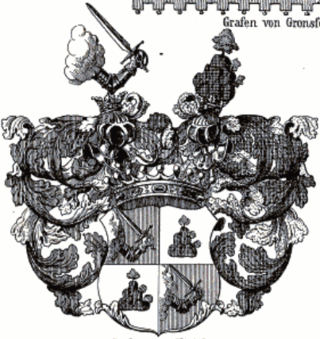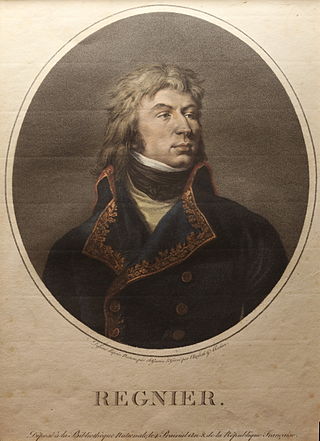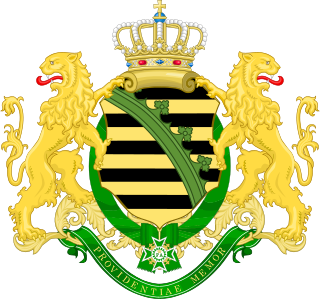See also
- All pages with titles containing Lecoq
- Monsieur Lecoq, a fictional character, the creation of Émile Gaboriau, a 19th-century French writer and journalist
Lecoq is a surname. Notable people with the surname include:
Clinton is an English toponymic surname, indicating one's ancestors came from English places called Glympton or Glinton. Clinton has frequently been used as a given name since the late 19th century. Baron Clinton is a title of the peerage in England, originally created in 1298.
Ollivier is a surname. Notable people with the surname include:
Nordmann is the demonym of the Norwegian people in its native language.

Johann Adolf, Freiherr von Thielmann was a Saxon general who served with Saxony, Prussia and France during the Napoleonic Wars.
Lettow was a by-name given to a few Pomeranian nobles from a noble family from Vorbeck who went to assist Algirdas and Vytautas, the Great Dukes of Lithuania, in the 14th century. Lettow meant "Lithuania" in the Saxon language, and it appears in the General Prologue to The Canterbury Tales, wherein it is said of the Knight, a veteran of the Baltic Crusades: "Ful ofte tyme he hadde the bord bigonne / Aboven alle nacions in Pruce; / In Lettow hadde he reysed, and in Ruce, / No Cristen man so ofte of his degree."

The Hügel family is a German noble family originating from Württemberg. In 1790, members of the younger branch of the family were elevated to the rank of Imperial Baron by Leopold II, while in 1801 members of the elder line of family were raised to the same rank by Francis II, Holy Roman Emperor. On 13 June 1879 the elder branch of the family was raised to the hereditary title of Count in the Kingdom of Württemberg by King Charles I. This comital branch of the Hügel family was closely related to the Dukes of Teck, morganatic branch of the House of Württemberg. Countess Amalie von Hügel was paternal aunt of Queen Mary.
Wild is a surname. Notable people with the surname include:
Ordóñez or Ordoñez is a Spanish surname. Notable people with the surname include:

Jean Louis Ébénézer Reynier was a Swiss-French military officer who served in the French Army under the First Republic and the First Empire. He rose in rank to become a general during the French Revolutionary Wars and led a division under Napoleon Bonaparte in the French campaign in Egypt and Syria. During the Napoleonic Wars, he continued to hold important combat commands, eventually leading an army corps during the Peninsular War in 1810–1811 and during the War of the Sixth Coalition in 1812–1813.

Hans Ernst Karl, Graf von Zieten was an officer in the Prussian Army during the Napoleonic Wars.

The Stößner family is the name of an ancient house of German nobility.

The Royal Saxon Army was the military force of the Electorate (1682–1807) and later the Kingdom of Saxony (1807–1918). A regular Saxon army was first established in 1682 and it continued to exist until the abolition of the German monarchies in 1918. With the formation of the Confederation of the Rhine by Napoleon the Royal Saxon Army joined the French "Grande Armée" along with 37 other German states.

In the siege of Hamelin or siege of Hameln, First French Empire forces captured the fortress of Hamelin from its garrison composed of troops from the Kingdom of Prussia. The siege was begun by the VIII Corps under French Marshal Édouard Adolphe Casimir Joseph Mortier. The marshal initially left General of Division Jean-Baptiste Dumonceau in charge of operations. General of Division Anne Jean Marie René Savary soon arrived to conduct negotiations with the Prussian commander General Karl Ludwig von Lecoq, who was quickly persuaded to surrender. Technically, the operation from the War of the Fourth Coalition was a blockade because a formal siege never took place. Hamelin is located 36 kilometers southwest of Hanover.
Karl Ludwig von Lecoq or Karl Ludwig von Le Coq, born 23 September 1754 – died 14 February 1829, of French Huguenot ancestry, first joined the army of the Electorate of Saxony. He later transferred his loyalty to the Kingdom of Prussia and fought during the French Revolutionary Wars, earning a coveted award for bravery. While serving variously as a staff officer and diplomat, he became renowned as an expert cartographer. In 1806 he was entrusted with command of the forces in northwest Germany. Cut off from the main body of the Prussian army after the disaster at the Battle of Jena-Auerstedt, he concentrated his troops in the fortress of Hameln. After a brief siege, he surrendered his troops to an inferior force of enemies. For this, he was sentenced to life imprisonment. However, he was later pardoned and continued his map-making until he went blind.
Colloredo is a surname that may refer to:
Le Coq may refer to:
Lancey is a surname. Notable people with the surname include:
Boisbaudran is a surname. Notable people with the surname include:
Langeron is a commune in central France. People with the surname of Langeron include:
Arabin is a family name originating in Provence in the south of France, as d'Arabin or D’Arabien.